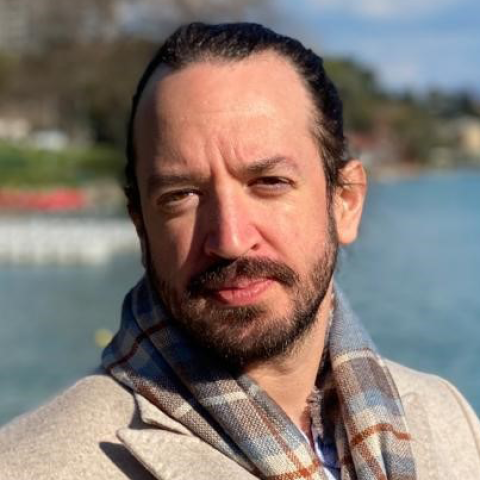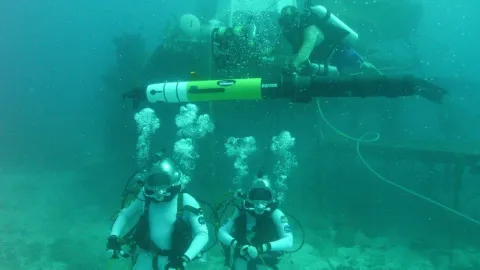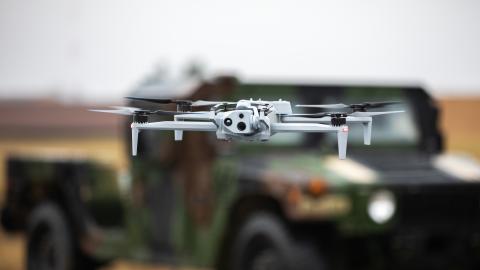Testimony before the U.S. Senate Committee on Small Business & Entrepreneurship March 12, 2020
Watch the full hearing: https://www.sbc.senate.gov/public/index.cfm/hearings?ID=A75AE3C7-6C0F-43B8-822C-FFB03B1A723A
Chairman Rubio, Ranking Member Cardin, and members of the Senate Small Business Committee, I thank you for the invitation to testify here today, and for the opportunity to represent the Hudson Institute, to share my views on “The Coronavirus and America’s Small Business Supply Chain.”
As you may know, prior to joining the Hudson Institute, I spent 18 months at the White House National Security Council; for approximately 12 of those months, I was privileged to lead the Counterproliferation and Biodefense directorate, which included the team of exceptional professionals who drafted and have implemented the National Biodefense Strategy, an Executive Order to modernize influenza vaccination, and coordinated the interagency and international response to the outbreak of Ebola in the Democratic Republic of Congo. That team, despite uninformed rhetoric to the contrary, was never dismantled and continues to serve today as the United States responds to COVID-19.
Based on the expertise you have gathered here today, I will focus my testimony on the manner in which the Chinese Communist Party (CCP) conducts its affairs domestically and internationally, including by distorting free markets to the detriment of our small-, medium-, and large scale businesses, our national security, and our health security.
Let’s start with the cold reality and the simple fact that the Chinese Communist Party initially concealed the fact of the viral outbreak of what we now know as COVID-19 from the Chinese people, international healthcare authorities like the World Health Organization (WHO), and other nation states, including the United States.
According to the World Health Organization (WHO), the National Health Commission of the PRC initially knew of the “Wuhan virus” as early as December 8, 2019. Yet, initial substantive disclosures to the WHO did not take place until approximately January 11, 2020.1
I don’t think it’s too much to ask how many people in the United States and elsewhere have been infected, gotten sick, or worse as a consequence of the Chinese Communist Party’s decision to sit on the fact of this epidemic?
In fact, I think you as our elected officials must demand the answer to this question and determine how to respond.
This is not a new phenomenon when dealing with the CCP, unfortunately.
Many of us will remember the outbreak of SARS in 2003, which the communist party also concealed from the Chinese people and world until it was a full-blown epidemic.
Alarmingly, the Chinese Communist Party has continued to censor information on such Chinese social media apps as WeChat.2 It is actively denying information to its people.
By now, we all have heard about Dr. Li Wenliang, who was among the first to call attention to the spread of COVID-19 in China. It’s been reported that his dissemination of his findings about the then-unidentified virus on a WeChat chat room ultimately attracted the attention of authorities, which led to his detention. He tragically died from the virus as a result.3
At the same time, the Chinese Internet has been overtaken by conspiracy theories that the “Wuhan virus” actually originated in the United States, not in Wuhan province.
Does anyone in this hearing room actually think the Chinese Communist Party isn’t tacitly accepting, if not actively promoting, this misinformation?4
It is an inescapable conclusion that due to the insecurity, corruption, and lack of moral legitimacy of the Chinese Communist Party, it fears the kind of openness and transparency that we in the West take for granted.
Too often we turn our backs on the CCP’s malevolence because it only affects the Uyghurs or Tibetans, or the Chinese people themselves. We don’t think it affects us.
And we seem to nonchalantly accept China’s behavior when it involves predatory economics against our businesses or those of its mercantilist clients in the “One Belt, One Road” ecosystem in Africa, Asia, and, increasingly, Europe.
But this is all part-and-parcel of the same corrupt Chinese Communist Party that concealed the existence of COVID-19 when we could have taken steps to protect the American people before this virus reached our shores.
A few weeks ago, I wrote an op-ed on the extent of how China might use, with either benign or malignant intent, the leverage we gave it over the U.S. health care system.5
I will not repeat myself here today, but I will focus on a few key points, without preempting what my colleagues will likely have to say.
In 2004, as Ms. Gibson will likely explain, the United States stopped making penicillin domestically. This happened without a vote in this body. It happened without decision in the Executive Branch. I am aware of no part of our government that was consulted about this decision.
It was a decision made in a corporate board room based on short-term decision focused on showing a profit on a balance sheet.
And it was a decision prompted by China’s Made in 2025 plan to dominate what the CCP determined were strategic sectors which Chinese industry should control globally.6
But that’s where we are during this global public health emergency.
And so we are here today to ask, “on a good day, what does it mean to rely on the People’s Republic of China for our basic health care commodities?”
Larry Wortzel, a member of the U.S.-China Commission will tell you about his blood pressure medicine making him sick because it was contaminated with rocket fuel in a Chinese manufacture facility.7 Rocket fuel.
Surgeons around the country may tell you about the hundreds if not thousands of surgeries that were cancelled because millions of surgical gowns had to be recalled because they were manufactured in the PRC and may not have been sterile when they were packaged up and sent to the United States.8 This was January of this year.
What about a bad day? What about malign intent?
For example, what if this body passes a resolution demanding a high-level visit of an American official to Taiwan, in furtherance of the Taiwan Travel Act of 2018?
What if the United States chooses to sanction Huawei, or another Chinese state-proxy, for the Uyghur suppression?
What if the Chinese Communist Party decides to retaliate to these sovereign decisions by cutting off the shipment of medicine to the U.S.?
Think it can’t happen?
Ask the Japanese who lost access to rare earth elements from the PRC in 2010 over a territorial dispute.9
Already, we are seeing shortages of basic medication like acetaminophen – otherwise known as “Tylenol” – which, of course, we depend on factories located in the PRC to produce.10
The PRC’s state-owned Xinhua, a communist party propaganda outlet, recently noted that the PRC could “plunge [the U.S.] into the mighty sea of coronavirus” if it wanted to do so.11
Can we realistically expect to enforce our security guarantees in East Asia against aggression by the People’s Republic of China when we can’t even ensure our own health care security here at home?
This committee has a role to play to reverse this situation. I ask you to consider the following:
First, I urge you to conduct a comprehensive survey of the strategic sectors where small-, medium-, and large-scale businesses depend on the People’s Republic of China for their supply chains. You can start with the Made in China 2025 plan.
Second, the term “industrial policy” is considered by some economic theorists and purists to be dirty words. But understand this, China Inc – China’s state sponsored capitalism – has destroyed the free market in many sectors, from 5G to Active Pharmaceutical Ingredients. Just look at the PRC’s Made in China 2025 plan for the roadmap. The CCP has not been shy about this – it does not think we will respond to its predations.
You cannot expect American producers and innovators – especially small businesses – to try to survive against the full economic might of the Chinese Communist Party all alone.
Continuing to refuse to fight back against such predatory economics is also known as “unilateral disarmament.”
I ask you to think about all of the tools of economic statecraft you can use to support American producers in strategic industries.
For example, I know several of you were involved in the passage of the BUILD Act in 2018. This was an effort to leverage private sector investment in international development to counter China Inc.
What other tools are available to do the same at the Small Business Administration or the Export-Import Bank?
I urge you, do not allow America’s job creators and innovators to continue to be unilaterally disarmed. Their government can and should defend them from foreign aggression.
Third, consider legislation to promote the development of an American market in strategic sectors like healthcare.
Chairman Rubio, your amendment to last year’s NDAA concerning reliance on the PRC for pharmaceuticals is a key step. You sounded the alarm on this risk.
As does H.R. 4710, the Pharmaceutical Independence Long-Term Readiness Reform Act, introduced by Representatives Garamendi and Hartzler, would leverage the resources of the Defense Production Act and the market power of the Department of Defense through TRICARE and the Department of Veterans Affairs, to create new opportunities for ensuring domestic supply chains.
Lastly, I know several of you are on the Senate Foreign Relations Committee and related national security committees. I encourage you to investigate the influence of the PRC in international organizations like the WHO. Ask yourselves why, despite meeting all of its established criteria, the WHO still has not labeled COVID-19 a “pandemic.”12 What influence, what tools of suasion, is the PRC using against the WHO?
I want to thank you for the opportunity to testify here today. I stand ready to answer your questions.















